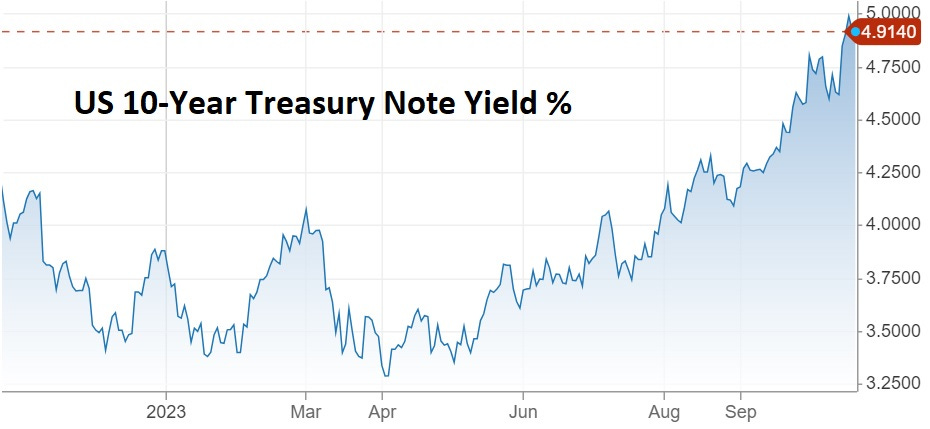by JOHN RUBINO
Inflation stops being a problem. Now for another Great Recession
One of the many surprising things about the Everything Bubble was the way interest rates kept rising. A lot of observers (including this one) believed that in each successive bubble, the “terminal” interest rate — that is, the rate that starts to break things, causing a crash — would be lower because the amount of bad debt was always rising.
In the housing bubble of the 2000s, the 10-year Treasury yield hit 5% before everything fell apart. So something less than that — say 4% — seemed to be a logical terminal rate for this cycle. But the 10-year yield blew through that level and just kept on going, hitting 5% in late October, and taking 30-year mortgage rates to a ridiculous (given sky-high house prices) 8%.

Inflation was the perceived culprit. As long as consumer prices were rising at more than the Fed’s target of 2%, the conventional wisdom had rates staying “higher for longer.”
Then everything changed
October’s Consumer Price Index (CPI) and Producer Price Index (PPI) were just released, and both were shockingly weak. Many prices are now falling:

Now the other bad news makes sense
Signs of a slowdown have been multiplying (see here, here, and here) but high inflation overshadowed those other stats. Now everything is pointing in the same direction — down hard — so the other bad news fits the new narrative. Some recent headlines:
Retail sales in the U.S. fall for first time in 7 months
(MarketWatch) – Sales at retailers nationwide fell 0.1% in October and dropped for the first time in seven months. It was the first negative reading since March, the government reported. Retail sales represent about one-third of all consumer spending and usually offer clues on the strength of the economy.
Consumers are struggling with credit card debt
(CNBC) – Feeling the pressure of inflation and rising interest rates over the past few months, an increasing number of consumers have been making credit card payments 30 days late or more. That climbing “credit card delinquencies” rate may trend higher this holiday season. Typically, it’s at the end of the year when more consumers start to pay late.
Walmart shares slide as retailer gives a cautious outlook about consumer spending
(CNBC) – Walmart topped Wall Street’s fiscal third-quarter earnings estimates as sales rose, but the big-box retailer struck a cautious tone with its outlook after it saw consumer spending weaken at the end of the period. The company’s shares fell by 7% on the news.
Burberry Shares Tumble Most In Decade On Luxury Spending Slowdown
(Zero Hedge) – Shares of Burberry Group PLC tumbled the most in a decade on Thursday following an announcement that the British trenchcoat manufacturer is unlikely to meet its yearly revenue targets, citing a global downturn in luxury spending.
For the Sept. 30-ending second quarter, Burberry said falling sales in the US and a downturn in China led to comparable-store sales increase by only 1%, compared to 18% in the year’s first quarter. The company warned revenue targets for the year ending March 2024 won’t be met and noted that profits will be on the lower end of analysts’ forecasts.
U.S. crude oil prices fall 5% as supply grows amid demand worries
(CNBC) – U.S. crude prices fell 5% on Thursday as inventories rose while industrial production fell. U.S. crude inventories rose by 3.6 million barrels last week while production held steady at a record 13.2 million barrels per day, according to data released by the Energy Information Agency Wednesday.
Tapped-out consumers, frozen real estate, falling prices
Past bubbles like the dot-coms and sub-prime housing popped when those single overleveraged sectors imploded. But this time around it looks like the Everything Bubble will just crumble under the weight of its myriad imbalances. Not one thing, but many are rolling over, which leaves very few places to hide.